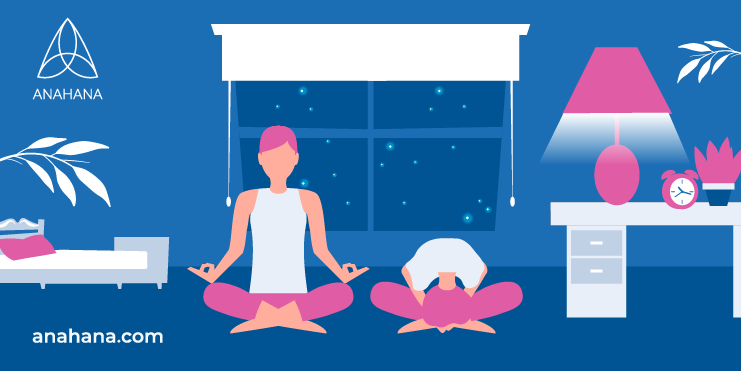
Table of Contents
Why meditate at night? Uncover the reasons behind night meditation's increasing popularity, its advantages, and step-by-step techniques to find peace amidst the quiet of the night.
What is Night Meditation?
Night meditation involves guided meditation practiced at night, usually to have a restful sleep. Despite the various meditation methods available, it offers an effective way to unwind after a busy day and prepare for a peaceful night's sleep.
In addition to promoting relaxation, it can help reduce stress, anxiety, and tension. If you're new to meditation, many resources, including guided meditations and apps, are available to help you get started.
Once you find a meditation technique that works for you can become a valuable tool for achieving greater peace of mind and body, eliminating racing thoughts, and ensuring you can get enough quality sleep.
Benefits of Night Meditation
Night-time meditation has many benefits, from improved sleep, focus and stress relief.
Quality Sleep
Meditating before bed helps you improve sleep and wake up feeling well-rested. Night meditation can help you improve your sleep hygiene and sleep better.
Meditating at night makes you likely experience fewer interruptions in your sleep and a wake-up after a truly restful night.
Calm Mind
It's common for people to have racing thoughts at night. Engaging in meditation offers you a valuable tool for unwinding and releasing the accumulated stress of the day.
As you immerse yourself in this practice, you will redirect your focus, letting go of the worries and tensions that may often plague your mind during nighttime.
Stress Relief
Nighttime meditation can lower stress levels by soothing the body's stress hormones, which, in turn, contributes to a heightened sense of relaxation and results in better sleep.
Improve Focus and Awareness
Meditation enhances your ability to concentrate, be present in the moment, and make better decisions.
Through regular meditation practice, you develop improved focus and awareness, enabling you to approach your daily challenges with clarity.
Emotional Balance
Meditating before bed helps you process your emotions, making you feel emotionally stable and strong.
In short, meditating before bed is a simple and effective way for you to find peace and sleep better. It reduces stress and improves overall well-being, making it a great addition to your nightly routine.
Best Meditation Types for the Night
Mindfulness Meditation
Mindfulness can take many forms, but the best type for nighttime meditation is one that intentionally relaxes the mind and body to promote deep rest. You can begin by finding a comfortable position and bringing awareness to the body, gradually releasing tension through a body scan.
Focus on the breath, using counting techniques to anchor attention and letting go of distracting thoughts. Incorporate visualizations or gratitude practice to deepen relaxation and transition into sleep with calm and peace.
Body Scan Meditation
A body scan helps ground your energy and calm your mind. It involves sitting or lying comfortably, which you can do right in bed, and systematically bringing awareness to different body parts.
Starting from the feet and moving upward, you observe sensations and consciously relax each area. This practice helps release tension and quiet the mind.
Try incorporating progressive muscle relaxation if you feel especially tense, anxious or agitated. Take 5 seconds to squeeze and engage all the muscles, and then take 10-15 seconds to feel the release of tension after you relax and let go.
Say to yourself, for example, “I am relaxing my feet” as you release tension in each part.
Breathing Meditation
Slow, deep, and mindful breathing helps ease the body into relaxation and sleep. Try equal breathing, where you inhale for a count of 4 and exhale for a count of 4. Once that feels comfortable and steady, you could count each breath on the exhale, counting from 1 to 8. Then start over at 1 until you feel drowsy.
If you find that your mind is overactive, you can use the 4-7-8 breathing practice to help focus your mind, as you inhale for 4 seconds, hold for 7 seconds, and then exhale for 8. As you exhale, make a “shhh” sound like pursed lip breathing.
Feel your abdomen moving as the breath is flowing. Repeat the 4-7-8 breathing pattern for several rounds, allowing each breath to be slow, smooth, and controlled. Making your exhale twice as long as you inhale triggers the physiological relaxation response and calms the nervous system.
Gratitude Meditation
Gratitude meditation at night is a powerful practice that encourages focusing on life's blessings and positive aspects before sleep. By intentionally reflecting on what we are grateful for, we shift our mindset from stress and worry to appreciation and contentment.
This practice can help quiet the mind, reduce anxiety, and promote a sense of well-being, creating an optimal state for restful sleep. Regular gratitude meditation can cultivate a more positive outlook, enhancing our overall quality of life and resilience in facing challenges.
How to Practice Night Meditation as a Beginner

Meditation can be practiced anywhere and anytime, including before bed. Guided meditations can be of great help as well. Here are a few tips if you're a beginner wanting to try night meditation:
-
Comfortable position: First, find a comfortable position. You can sit in a chair with your feet flat on the ground or lie down on your back. If you lie down, ensure you're comfortable and that your spine is aligned.
-
Breathwork: Second, close your eyes and focus on your breath. Night meditation combined with breath work is very beneficial. Breathe deeply and slowly, letting your belly expand on the inhale and fall back on the exhale. Try to let your breath flow naturally.
-
Mantra: Third, focus your attention on a mantra or positive affirmation. Repeat the mantra silently or aloud - whichever feels more comfortable for you. You can also count each breath if that helps keep you focused.
-
Thoughts: Fourth, if your mind wanders, notice the thoughts and let them go. Refrain from getting caught up in the thinking processes by thinking about the past or future - focus on the present moment.
-
End: Fifth, when you're ready to end the meditation, slowly open your eyes and take a few deep breaths. Stretch your body if needed, and prepare for a good night’s rest.
“Sleep is the best meditation” -Dalai Lama
Common Challenges with Night Meditation
People face a few common challenges when trying to do night-time meditation. Here are a few of the most common:
-
Focusing on your breath and mantra when fatigued.
-
Increased nighttime mind wandering.
-
Difficulty maintaining comfort during prolonged periods
Despite these challenges, night meditation can be a great way to relax and sleep. There are many different techniques that you can try, including self-guided sleep meditations, guided meditations, and apps that provide instruction or meditation music.
Things to Avoid with Night Meditation
There are a few things that you should avoid while meditating at night to make the most of your session.
-
Screen exposure: Avoid watching television or using cell phones, as the bright light can be disruptive and make it difficult to fall asleep.
-
Eat light before bed: It is also beneficial to avoid eating a heavy meal. A full stomach can make relaxing or focusing on meditation difficult.
Meditations that involve intense visualization, energizing breathwork, or stimulating movements should generally be avoided at night, as they may interfere with your ability to relax and fall asleep.
Meditation practices that evoke strong emotions or require deep introspection might not be suitable for nighttime, as they could disrupt your ability to unwind and calm the mind before bed. For some people, this includes introspective journaling.
Gratitude journaling is more appropriate. It's best to opt for gentle, relaxing meditation techniques that promote tranquility and prepare the body and mind for sleep.
Try not to get frustrated if you feel like your mind is wandering and having racing thoughts. Meditation takes practice, and it's normal for your thoughts to wander during your session.
Notice those thoughts and gently bring your attention back to the present moment.
It can also be difficult to meditate for too long without a break. If you're new to meditation, it's best to start slow - especially if you're working towards falling asleep at night.
Try 10 or 20 minutes first and gradually increase the time as needed. You will experience the intended mental gratitude and wake up fresh and aware in the morning, ready to begin a new day.
With these tips, you can enjoy nighttime meditation benefits while avoiding common pitfalls that may interfere with falling and staying asleep.
Best Time to Practice Night Meditation
When integrated into your daily routine, night-time meditation offers many benefits, including improved sleep hygiene, better sleep quality, reduced stress, heightened mindfulness, and enhanced overall well-being.
Consider incorporating this practice into your evening before bed to experience the biggest advantages of making the most of your nighttime meditation sessions.
Frequently Asked Questions About Night Meditation
Can meditation replace sleep?
Most people need around eight hours of sleep per night. However, a few people claim that they only need four to six hours of sleep and that meditation can compensate for the rest.
While it is true that some people can function with less sleep than others, it is crucial to be aware that meditation cannot replace the benefits of a good night's sleep.
Sleep is essential for physical and mental health and is not easily replaced.
Can meditation help those with insomnia?
Night meditation alleviates insomnia and sleep disorders by reducing stress, enhancing sleep quality, and promoting mindfulness.
Stress and anxiety contribute to sleep issues, and meditation's relaxation benefits can help mitigate these factors.
Improved sleep quality and increased mindfulness lead to more restful nights. Meditation also reduces overthinking, common in those with insomnia, by quieting the mind.
Establishing a bedtime routine with night-time meditation signals the body to relax and prepare for sleep. For chronic or severe sleep problems, consult a healthcare professional for a holistic approach.
Can I use guided meditation for sleep meditation?
Yes, you can use guided meditation for night meditation. Guided meditation, with its soothing voice and relaxation techniques, can be especially effective before bedtime to help you get enough sleep.
It helps clear your mind, reduce stress, and create a peaceful environment conducive to sleep. You can find various guided meditation resources for nighttime, focusing on deep breathing, muscle relaxation, and visualization.
Incorporating this into your nightly routine can improve sleep quality and help you relax for a more restful night.
References
Mindfulness meditation helps fight insomnia, improves sleep - Harvard Health
https://health.clevelandclinic.org/sleep-meditation
https://www.medicalnewstoday.com/articles/how-to-meditate-in-bed
Disclaimer
The contents of this article are provided for informational purposes only and are not intended to substitute for professional medical advice, diagnosis, or treatment. It is always recommended to consult with a qualified healthcare provider before making any health-related changes or if you have any questions or concerns about your health. Anahana is not liable for any errors, omissions, or consequences that may occur from using the information provided.

By: Meriah McCauley
Meriah McCauley is passionate about the art and science of holistic health and healing. She explored the power of yoga through working with her mentor and guru Dr. Don Stapleton in Costa Rica. She also received a Masters in Psychology from Columbia University, specializing in Spirituality and the MindBody connection. Meriah now offers coaching, yoga teacher trainings, and Holotropic Breathwork for personal development. She loves to connect with those on this path.
